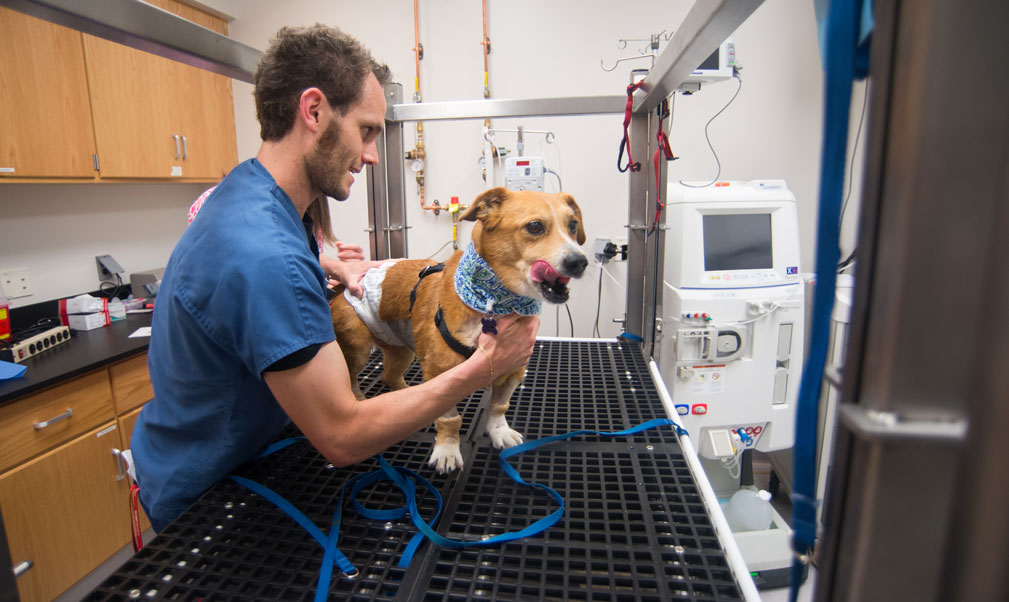NC State Veterinary Hospital Provides Dialysis Treatment

According to North Carolina State University College of Veterinary Medicine (CVM) clinical assistant professor Alessio Vigani, the most frequently-asked question he receives is also the most basic — “do you have dialysis services there?” The question comes from both referring veterinarians and individual pet owners.
So, for the record, yes, the NC State Veterinary Hospital provides small animal hemodialysis for both dogs and cats.
Vigani heads up the dialysis service, in conjunction with associate professor Bernard Hansen and clinical assistant professor Sarah Musulin from the Emergency and Critical Care (ECC) service, and professor of internal medicine Shelly Vaden. The service has recently been joined by two ECC and Extracorporeal Therapy Fellows, Christine Culler and Scott Taylor. This team provides hemodialysis, hemoperfusion (more about these in a moment), as well as plasmapheresis and cell-pheresis in conjunction with associate professor of medical oncology Steven Suter.
Hemodialysis comes into play with severe cases of acute kidney injury (kidney failure) resulting from infection or any other causes. Candidates for this treatment demonstrate such symptoms as not urinating, severe electrolytes imbalance, fluid retention, and are not responding to standard medical therapy.
Hemodialysis and hemoperfusion also come into play for the emergency treatment of severe intoxications from drug overdose or toxin ingestion. Rapid removal from the bloodstream of toxins such as ethylene glycol, an ingredient in antifreeze, or common human drugs as ibuprofen, aspirin, tylenol, antidepressants, and other various prescription drugs can represent a life saving intervention. Extracorporeal therapy also works for the removal of accidental overdoses of drugs used for the treatment of illness in the animal, such as chemotherapy agents, aminoglycoside antibiotics, phenobarbital and others.
Plasmapheresis, also known as Therapeutic Plasma Exchange (TPE) is widely used in human medicine for the treatment of immune mediated disorders. We are proud to be one of the very few centers in the country able to offer this strategy to pets with similar diseases. Immune mediated hemolytic anemia (IMHA), myasthenia gravis, and pemphigus are just a few examples of treatable conditions.
Vigani emphasizes that consultations are provided free of charge, and he encourages veterinarians not to hesitate to contact NC State with questions about these services. If it appears that a patient would benefit from being treated, a full discussion of cost and other factors would be included in the consultation.
A typical dialysis course of treatment would see a patient initially hospitalized for a one-to-two-week period, with outpatient treatments available, as well.
Vigani points out that in many cases, such as leptospirosis and other kidney infections, when standard treatments have failed and euthanasia is being considered, hemodialysis has a very good success rate, with rapid improvement frequently seen within 1 to 2 weeks. That is why a early consultation to determine the prospects for success is always a good idea.
So feel free to spread the word — NC State provides dialysis services for dogs and cats!
- Categories:


